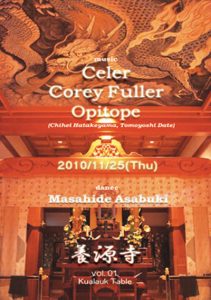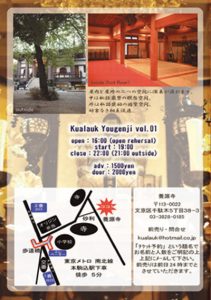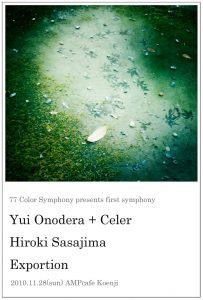Traces of a unique local vocabulary: A metropolis of pure sound.
The oeuvres of Yui Onodera and Celer have served as powerful reminders that music is, at heart, a wordless communication tool. While Onodera set architectural patterns and sociological ponderings to sound in a string of minutely planned works, the former’s discography typically dealt with themes manifesting themselves outside the grasp of rational analysis: Resembling haikus in their pointed precision and brevity, Baquet-Long’s associative lyrical introductions acted as portals into epic worlds where sound, space, time and resonance penetrated the true nature of emotion more accurately than any four-minute pop-song ever could. Of course, on both accounts, these statements were ultimately of a personal nature, a sonic transcription of inner perspectives. And yet, as their first collaboration, initiated as early as 2007, took shape, it quickly became apparent that its implications were far more universal and incisive than any of their solo records. Quite clearly, there was a place where the poetic and the political met – and Generic City made it its point of departure.
The openly conceptual aspects of their interaction only became apparent at a later stage, however – unsurprisingly for artists so deeply engaged with the pure, unmediated beauty of sound, questions of philosophy were relegated to second tier. On the face of it, therefore, there is no need whatsoever to treat Generic City as anything other than a languid and deep trip of sweetly scented atmospherics: Bracketed by an episode of nerve-wrecking bird song (cranes? wild geese?) and a tender music box finale, opener „An imaginary tale of lost vernacular“ is essentially a single, drawn-out drone all but imperceptibly changing in frequential richness and pulsation over the course of its sixteen-minute duration, with a delicate film of metallic chiming adding an ethereal halo. The way that some of the pieces are composed of various shorter episodes – especially so in the two somewhat more brief cuts „Waiting until something else happens“ and „The street of a rainy, gray day“, which, despite their more fragmented character, form a cohesive interrelated middle section – is also decidedly reminiscent of previous Celer-albums like „Engaged Touches“, which combined an epic outlook with an intuitive and scenic approach.
To the artists, meanwhile, the real importance of their collaboration lay precisely in its extra-musical dimensions. For Onodera, on the one hand, working with Celer allowed him a long-sought-for unpremeditated perspective on his Japanese identity. Already his 2007-release „Suisei“, which prominently featured on-site recordings of his hometown Tokyo, was an effort of sculpting a metaphorical landscape intricately intertwined with physical reality. And yet, even though its immersive introspection awarded it a hands-on quality, it was bound to remain an acoustic mirror of mainly emotional factors, a subjective analysis. On Generic City, this perceptional imbalance is offset by the process of sharing source materials in a bid of expressing global aspects of society through sound. For Long and Baquet-Long, vice versa, Onodera’s concretisation of their self-admittedly rather „vague“ notions at the outset awarded the final result a new kind of striking urgency and deliberation. Two, partially paradoxical, themes are serving as Leitmotifs in this respect: On the one hand, the levelling-out of local identities in favour of a water-downed cultural consensus. And, on the other, the idea of cities representing chaotic cosmoses, in which, underneath a blanket of supposed order, a plethora of individual events suggest the existence of a still free and liberated micro-cosmos. The latter is apparent through the multitude of different episodes the album is moving through: There are sounds from Winter and sounds of Summer, loud and aggressive episodes and almost inaudible sequences, noises of nature and of man as well as the delicate textures of breaking ice. None of the artists involved is afraid of cutting off some of the most placid and contemplative inventions right at the moment of their most heartfelt intensity: In one particularly striking passage, an at first fragile oscillation of the same chord alternately played in a minor and major key turns into what could well be a frenzied outburst of ragged guitar riffing.
As Onodera has pointed out, the way these seemingly diametrically opposed elements were made to correspond with each other was in fact inspired by the very ability of cities to merge and reconcile the most blatant contradictions. Despite its critical stance towards urban trends, Generic City is, after all, very much the product of three city dwellers putting their ultimate fantasy into practise: Creating a metropolis of pure sound. You can literally spend hours inside its thoroughfares and side-alleys, on its avenues and squares, in its parks and buildings. The utopia lies in the idea that, in such an imaginary space, sonic events will eventually detach themselves from their worldy limitations and start interacting according to the inner logic of their timbres alone. And so it seems perfectly natural that, on brooding and mysterious closer „A renewed awareness of home“, the massive reverberations of a huge gong are merging seamlessly into a Buddhist prayer chant filled with natural harmonics, which, in the end, gloriously coalesce into a glowing sheet of texture. „The street of a rainy, gray day“, meanwhile, includes a three-minute-sequence composed exclusively of field recordings, gradually segueing from a bustling city scene to the artificial calm of an airport and planes thunderously panning from left to right.
Nothing here is left to chance, even the most seemingly random snippet of sound having been selected with a very particular reason and compositional function in mind. Accordingly, the album is never just a trivial tirade against the side-effects of globalisation, but always a stab at an alternative as well. If Onodera is right, it is through listening closely to our immediate surroundings that we are still able to glean the traces of a unique local vocabulary. It is never fully spelled out on Generic City, but one can’t hold that against it: What really defines our sense of home and belonging can simply not be put into words.
By Tobias Fischer







